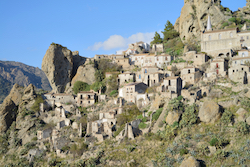History lessons for a more resilient future
The COORDINATINGforLIFE (Coordinating for life. Success and failure of Western European societies in coping with rural hazards and disasters, 1300-1800) project has found that while rising inequality in itself does not necessarily lead to higher vulnerability, the presence of intermediary groups is often crucial. Village communities, water management organisations and charities, for example, have historically played a key role in helping societies to prevent and recover from disasters. But with the decline of these middle groups their success in this dwindled. Moreover, the project has shown that when rises in material inequality are not addressed by way of institutional changes, societies do become more vulnerable. Another key finding has been that while some groups have proven to be highly vulnerable to hazards, others have always managed to escape the ‘storm’. “It is therefore not societies that are hit by a disaster, but very specific groups within society,” explains COORDINATINGforLIFE project coordinator Professor Bas van Bavel from Utrecht University in the Netherlands. “We feel this approach could be a vital antidote against too much of a focus on systemic vulnerability.” Durable societies Launched in 2014 and due for completion in 2019, the COORDINATINGforLIFE project has focused on Western Europe in the period between 1300 and 1800. Comparative analyses over this timespan have been carried out to try and identify what determines resilience. Today, societies around the world will likely be confronted with more disasters in the coming decades, particularly as a result of climate change. “This makes it crucial to better understand why some societies appear able to prevent hazards from becoming disasters or, if disasters happen, to cope with them and quickly recover,” says Prof. van Bavel. “There is also a growing consensus that relying on technological solutions and material resources alone will not suffice.” Prof. van Bavel points out that wealthy and technologically advanced countries are not spared disasters, as demonstrated all too clearly by the Fukushima disaster in Japan. This is why answers are increasingly being sought in the organisational capacities of society. “We know very little, however, about what these capacities are, and why they sometimes are successful in facilitating recovery and sometimes not,” says van Bavel. History as a laboratory The approach taken by the project has been to consider history as a living ‘laboratory’, where historical records can be analysed to test hypotheses. The long historical perspective of the project has enabled the team to compare widely differing cases and achieve insights into the relative performance of these societies. “Another interesting element of this project is that it combines history and historical methods with insights and expertise from economics, geography and climatology,” says Prof. van Bavel. “Our work has relevance for scholars working in the natural sciences, including the fields of climate change and epidemics. A key aim has been to enrich their understanding of present risks by adding an historical perspective.” The project team is currently working on a textbook entitled ‘History and Disasters’ – aimed at a wide audience of scholars from all disciplines, students and practitioners – and is developing links between historical research and current policy. This is being achieved not only through disseminating findings, but also through direct contact. “Project members are actively involved in networks on current climate change research and policy and contribute to briefing documents aimed at academics, NGOs and government agencies,” says Prof. van Bavel. “Moves to integrate historical knowledge into present-day flood protection schemes have already resulted in active collaboration in a Belgium-Dutch Estuary Restoration project (the Hedwige-Prosperpolder project), as well as several targeted presentations. In the longer term, this may result in a tech-transfer project, provisionally labelled ‘Building with nature and history’.”
Keywords
COORDINATINGforLIFE, climate change, history, epidemics, society, societies, community, village, disaster, Fukushima, resilience







